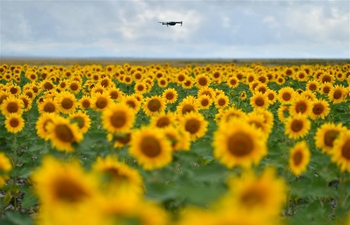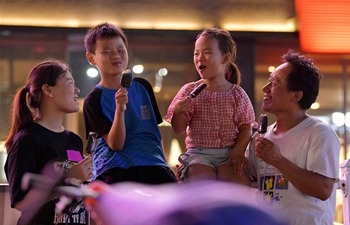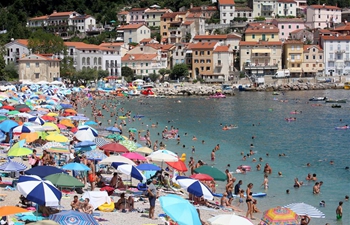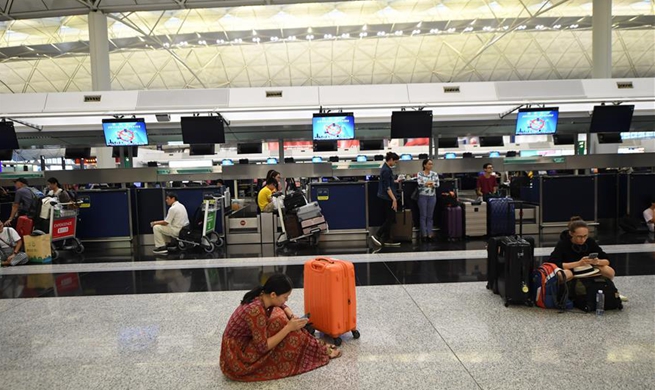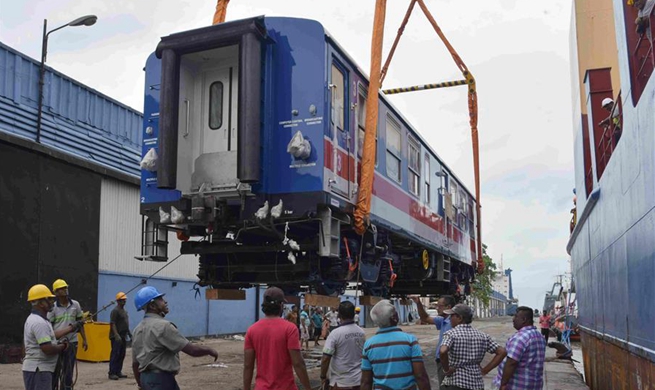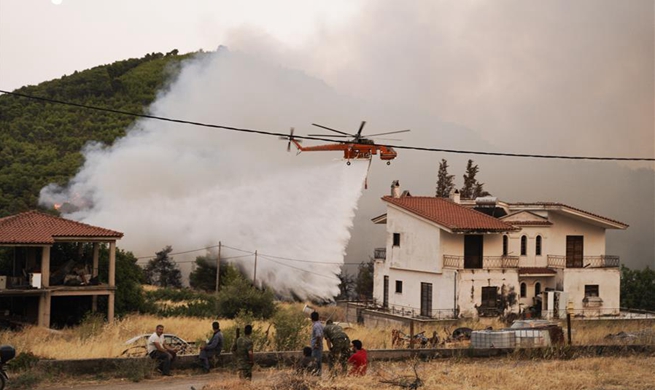by Yoo Seungki
SEOUL, Aug. 14 (Xinhua) -- A South Korean granny wept, and sometimes wailed, when she recalled her unforgettable, awful memory when she was a teenager in the 1940s. The memory was full of terror, hunger and anxiety that turned currently into irresistible fury over the Japanese government.
Kim Jeong-ju shared her memory at a press conference with foreign correspondents in Seoul Wednesday, a day before the 74th anniversary of the Liberation Day to mark the liberation of the Korean Peninsula from the 1910-1945 Japanese colonization.
The 88-year-old was forced into hard labor by Imperial Japan when she was a primary school student. She was told by a Japanese school teacher that if she went to Japan, she could meet her elder sister and attend secondary school with the sister.
It did not take long before realizing that she was duped by the teacher. As soon as she arrived at a munition factory of Nachi-Fujikoshi Corp., Kim received a military uniform and slept the first night at a dormitory fenced with barbed wires.
Kim woke up 5:00 a.m. every morning, and went to the factory singing a military song after having a meager breakfast. A slice of bread was given for lunch. She had to stand on two columns of apple boxes to work as she was too short to reach out to machinery.
With extreme hunger, she had to pluck up grass to eat. Suffering from heavy labor and chronic starvation, she saw her hair fall off. The teenager never slept taking off shoes for fear of air strike until she came back to her hometown about three months after the peninsula's liberation.
The awful memory did not belong to Kim alone. Her elder sister was also duped and forced into hard labor without pay at a munition factory of Mitsubishi Heavy Industries during the Pacific War.
"(The Japanese government) says we suffered nothing. I feel very upset. If Japanese people suffered the same, (the Japanese government) shouldn't have said so... I cried so much. I didn't say even to my family when I went for trials in court," said Kim.
The South Korean top court ruled that Japanese companies forcibly conscripting South Korean people during World War II, including Nippon Steel and Mitsubishi Heavy Industries among others, should compensate the victims.
In apparant protest against the South Korean top court's ruling and the similar orders by lower courts, the Japanese government last month tightened regulations on its export to South Korea of three materials vital to produce memory chips and display panels, which are the mainstay of the South Korean export.
Earlier this month, Japan removed South Korea from its whitelist of trusted export partners that are given preferential export procedure. In response, Seoul also dropped Tokyo off its whitelist.
"I lived a life full of sorrow... Japan destroyed my whole life... (Japan) must acknowledge, apologize and compensate... I believe people in Japan, who knows the truth, will help us," said Kim.
Kim expressed her thanks to Japanese people who supported her fight for apology and reparation from the Japanese government. One of them was Hideki Yano, Secretary General of the National Network for Forced Labor, a Japanese civic group taking side with the South Korean forced labor victims.
"(Former Prime Minister of Japan) Murayama acknowledged and apologized for Japan's past war of aggression and its colonization in 1995. If so, (the apology and acknowledgement) should be put in practice with clear government policies. I'm just one of the Japanese people who think so," said Yano.
Yano, who said he was being called by some Japanese netizens as an anti-Japan Japanese, said the historical issues, which should be resolved, should be resolved clearly, calling for the governments of South Korea and Japan to start dialogue to comprehensively settle the issue by involving all of the South Korean victims.
Japan has claimed that the 1965 treaty, which normalized the diplomatic relations between South Korea and Japan after the colonial era, settled all colonial-era issues, but the South Korean top court ruled that it did not involve the individuals' right to compensation.
In August 1995, then Japanese Prime Minister Tomiichi Murayama apologized to Asian neighbors, which had suffered from Japan's colonization, war of aggression and brutalities under its militaristic past.
The current Japanese government under Prime Minister Shinzo Abe has sought to deny the imperialist past, so the South Korean victims regarded the denial as the retraction of the apology.
"I really wish to hear even a word of apology (from the Japanese government) and reparation (from the Japanese company)... Before that, I cannot close my eyes even after death," said the 88-year-old Kim.
South Korean historians say as many as 2 million Korean people, including 200,000 victims registered with the South Korean government, were forced into hard labor by Japan during the colonial rule. The number rises higher including forced labor victims from Asian countries.

